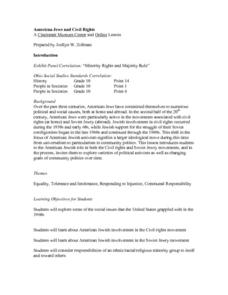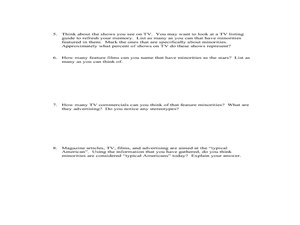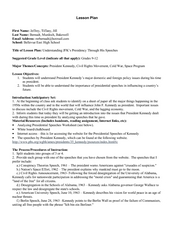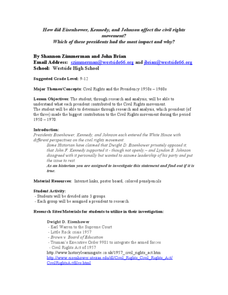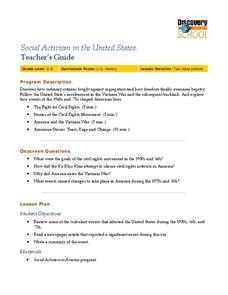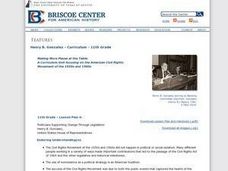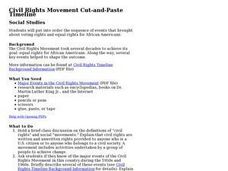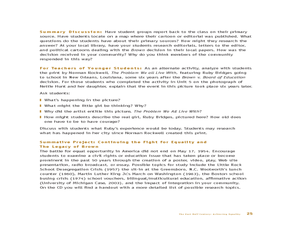Curated OER
American Jews and Civil Rights
Tenth graders examine the Civil Rights movement of the 1960's and how American Jews were involved. They discuss the responsibilities of any minority or ethnic group. They consider the process of change in politics as well.
Curated OER
Civil Rights Time Line
Learners create a time line about important events in the civil rights movement of the 1950s and 1960s.
Newseum
'The Press and the Civil Rights Movement' Video Lesson
Scholars watch a video featuring journalists who covered the civil rights movement, then respond to questions on a viewing guide. The video features interviews with participants and original news footage from the 1950s and 1960s. In...
Curated OER
The Civil Rights Movement Encyclopedia
Students conduct research on the Civil Rights Movement and participants in order to create an encyclopedia with alphabetical articles about some of the leaders and the ordinary people who made a difference in the movement. The articles...
Curated OER
American Women Who Shaped the Civil Rights Movement Explored Through the Literature of Eloise Greenfield
Examine the women who contributed to the Civil Rights movement. In groups, children read excerpts of writings from Eloise Greenfield and research the women she mentions using the internet. To end the instructional activity, they create a...
Newseum
Civil Rights News Coverage: Looking Back at Bias
Not all southern newspapers covered the civil rights movement of the 1950s and 1960s. Young journalists investigate how The Lexington (Ky. Herald-Leader and The Jackson (Tenn.) Sun re-examined their coverage of the movement. After...
Curated OER
Minorities in Mainstream American Society
So many people fought for Civil Rights in the United States. Read about the Civil Rights Act of 1964, and discuss what the act guarantees. Then pass out a slew of magazines and encourage them to observe how often minorities appear in...
Curated OER
Understanding JFK's Presidency through his Speeches
Students reflect and discuss the major events that happened in the United States in the 1950's and 1960's. In this U.S. History lesson, students read and analyze the famous speeches during this time frame, then complete a worksheet that...
Curated OER
How did Eisenhower, Kennedy, and Johnson affect the Civil Rights Movement?
Students research Eisenhower, Kennedy, and Johnson then utilize their findings to determine what each of the three Presidents contributed to the Civil Rights Movement. In this U.S. History lesson, students work in small groups to create...
Defining US
Integration of Education and American Society
How did the struggle for Civil Rights during the 1950s transform American society and politics? Why are American schools integrated today? Class members explore these essential questions by examining a series of primary and secondary...
National Endowment for the Humanities
"Sí, se puede!": Chávez, Huerta, and the UFW
"Sí, se puede!" Cesar Chavez and Dolores Huerta believed organizing farm workers and changing their working conditions were possible. Scholars examine provisions of the Bracero Program, videos, and the United Farm Workers' (UFW) work....
Albert Shanker Institute
The March on Washington Logistics Then and Now
I have a dream ... that all pupils will be able to organize a march of their own after learning about how Bayard Rustin organized the 1963 March on Washington for civil rights. Young reformers work collaboratively examining informational...
Curated OER
Social Activism in the United States
Seventh graders explore the goals of the Civil Rights Movement of the 1950s and 1960s. In this US History lesson plan, 7th graders read a newspaper article that reported a significant event during this era. Students write a summary of...
Curated OER
Making More Places at the Table: The American Civil Rights Movement of the 50's and 60's
Eleventh graders examine the biography of Henry B. Gonzalez. They examine primary source documents from Congressman Gonzalez's personal papers related to his contributions to the Civil Rights Movement.
Curated OER
Rosa Parks and the Montgomery Bus Boycott
Students dramatize incident that started the civil rights movement of the 1950s and 1960s: Rosa Parks's refusal to give up her seat on a bus in Montgomery, Alabama.
Teaching Tolerance
Using Photographs to Teach Social Justice | Confronting Unjust Practices
A powerful photograph of the Freedom Riders of 1961 launches an examination of the de jure and de facto injustices that the civil rights movement of the 1950s and 1960s addressed. Young historians first watch a video and read the Supreme...
Curated OER
Civil Rights Movement Cut-and-Paste Timeline
Students put into order the sequence of events that brought about voting rights and equal rights for African Americans. The creative project can be made very crafty by having students cut out the timeline to be combined with others in a...
Learning for Justice
Mary Church Terrell
Excerpts from an 1898 speech by civil rights activist Mary Church Terrell offers young scholars an opportunity to investigate how Black American women fought for civil rights long before Rosa Parks and the civil rights movement of the...
Curated OER
Civil Rights Leaders
Tenth graders investigate three American leaders from the Civil Rights Movement while they examine the early 1960's and the topic of racial equality. They listen to music from the era, read speeches, and look at images of Martin Luther...
National Woman's History Museum
Gloria Steinem, Feminism and “Living the Revolution"
Excerpts from Feminine Mystique by Betty Friedan and from Gloria Steinem's "Living the Revolution" provide high schoolers an opportunity to study the feminism of the 1950s and 1960s, sometimes called the "Second Wave of Feminism."
Curated OER
In the Struggle for Equality and Justice for All
Students focus on the struggle for minorities rights. They describe the civil rights movement of the late 1950's and the 1960's. They trace the roots of the movement in the second-class treatment accorded many black Americans and...
Curated OER
20th Century Civil Disobedience
Students write from varying perspectives in the American South about the civil rights movements in the 1950s. In this civics lesson plan, students view video clips and take notes. Students discuss the film and listen to a lecture on...
Curated OER
The Past Half Century: Achieving Equality
Young scholars analyze reactions to the Brown vs. Education decision of 1954. In this segregation lesson, student look at the actions that were taken in the education world as a result of the Brown decision. They watch a CD, examine...
Curated OER
Children's March Teacher's Guide, Activity 6
Learners see the role that different genders played in the Civil Rights Movement in Birmingham. They explain how popular culture influences them.


